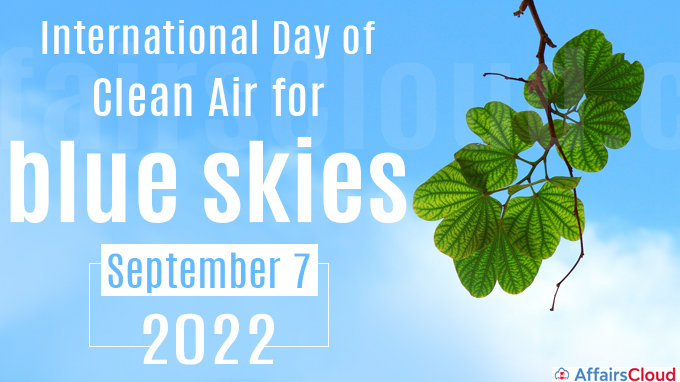 The United Nations(UN)’s International Day of Clean Air for blue skies is annually observed across the globe on 7th September to highlight the importance to raise public awareness to promote and facilitate actions to improve the quality of air.
The United Nations(UN)’s International Day of Clean Air for blue skies is annually observed across the globe on 7th September to highlight the importance to raise public awareness to promote and facilitate actions to improve the quality of air.
- 7th September 2022 marks the observance of the 3rd International Day of Clean Air for blue skies.
The theme of International Day of Clean Air for blue skies 2022 is “The Air We Share”.
- The theme focuses on the transboundary nature of air pollution and stresses the need for collective accountability and action.
Background:
In 2019, the Second Committee of the 74th session of the United Nations General Assembly (UNGA) adopted the resolution A/RES/74/212 designating the 7th September of every year as the “International Day of Clean Air for blue skies”.
- The first ever International Day of Clean Air for blue skies was observed on 7th September 2020.
Problems of Air Pollution:
Health Impacts:
i.According to World Health Organization (WHO), almost entire world’s population (99%) breathes air that exceeds the WHO air quality limit.
ii.The exposure to household and ambient (outdoor) fine particulate matter air pollution causes an estimated 7 million premature deaths each year.
iii.The fine particulate are responsible for one-third of deaths from stroke, chronic respiratory disease, and lung cancer.
Climate Impacts:
The short-lived climate pollutants black carbon, methane, tropospheric ozone, and hydrofluorocarbons are mostly linked with both health effects and near-term warming of the planet.
Observance:
i.The UN Environment Programme (UNEP) and its partners have develop a range of informations like interactive web feature on actions people can undertake in social media
ii.The Chief Scientists of the Food and Agriculture Organization of the United Nations (FAO), WHO, the International Union for Conservation of Nature (IUCN), the World Meteorological Organization (WMO) and UNEP have issued statements highlighting the critical issues that affect all.
WMO Air Quality and Climate Bulletin 2022:
Ahead of the International Day of Clean Air for blue skies, WMO released the Air Quality and Climate Bulletin 2022, the 2nd in an annual series, which focuses in particular on the impact of wildfire smoke in 2021.
- The annual WMO Air Quality and Climate Bulletin reports on the state of air quality and its close interlinkages with climate change.
World Meteorological Organization(WMO) is the UN’s authoritative voice on Weather, Climate and Water.
Key Points:
- The report states that if the greenhouse gas emission remains high, the global temperature would rise by 3-degree celsius from preindustrial levels by the second half of the 21st century.
- The Surface ozone levels are expected to increase in the highly polluted regions. This includes a 20% increase across Pakistan, northern India and Bangladesh, and 10% across eastern China.




